
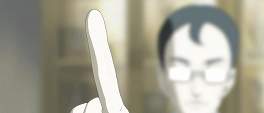
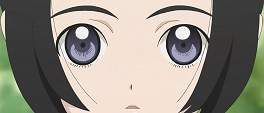

Putting together Production I.G. and Shirow Masamune is cause for celebration nowadays; most noted for his hand in the blindingly excellent Ghost in the Shell universe, even his lesser known works such as Appleseed and Dominion Tank Police stand out as unique and filled with his trademark personality. Given that, it may seem odd that Ghost Hound seems such a vast departure from his other works.
it is difficult to pick fault with Ghost Hound when it is so expertly produced in all areas
It is less odd when one realises that the series is liberally adapted from a work that Shirow created twenty years ago, that the screenplay is penned by Chiaki J. Konaka and is directed by Ryutaro Nakamura, both of whom were in the same positions for Serial Experiments Lain. It then becomes all the more apparent where the mind bending, perception altering experience comes from. Starting with a trip into the protagonists dream, Ghost Hound never quite lets go and always has that ephemeral, dream like quality to its story, visuals, and most prominently, its sound.
Read the rest of this entry
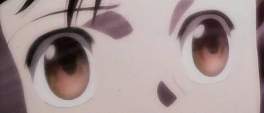



It's inevitable that Mokke is going to be compared to the seminal Mushishi: it deals with a similar "hidden to all but those who can see" neer-do-wells, has a similar way of dealing with them and maintains the same kind of morality about their place within nature. This may sound like Mokke is nothing but a substandard copy of Mushishi but in actuality, the similarities are minimal at best.
Pleasant and charming it may be however it doesn't have the humanity or the depth to maintain interest.
Ostensibly set in modern day with two sisters, the younger of the pair has the ill fortune to be easily possessed by wandering spirits while the other older of the two is able to see and hear the ephemeral critters, a gift she shares with her grandfather. The first three episodes take different approaches to dealing with the entities: the first is about the older sister wanting to protect the younger one culminating in her banishing a shadowy antagonist, the second is about a helpful but tricksy fox spirit, while the third is about a spirit which follows a doubting person around, devouring their confidence and vitality. The nature of the entities is stated on a case by case basis and borrows more from Buddhist and Shinto mythology than the "part of nature" route taken by Mushishi. In terms of comparisons, Mokke borrows more from Dennou Coil than it does anything else; the similar focus on younger children rather than teenagers or adults, even the first spirit is akin to Dennou Coil's digital aberrations.
Read the rest of this entry




A mix of French, English and what one can only assume is Japanese in the title? It must be the school-romance genre. Kimikiss is unashamedly pedestrian in its subject matter and plants itself squarely in the mid-teen age range in both content and audience. The first three episodes do little else other than set a suitably solid foundation for future angst and trauma from the bevy of humdrum adolescents.
as unchallenging as it may be, romance aficionados may find much to get wrapped up in
Beginning inauspiciously with a returning childhood friend, a confusingly out-of-place kiss and other paraphernalia which is sure to be over-analysed as the series progresses. The characters of kimikiss, supposed to be the meat of the series, can initially be written off as typical and uninteresting; sporadically however they staunchly refuse to resort back to their obvious archetypes and plough forward giving the illusion of momentum when in fact nothing has changed. The set up of ditzy boy liking introverted girl has been recycled innumerable times before, most memorably the recent School Days, although there is little indication of murderous tendencies here; instead it is a gentle, soap-opera flow with no ideas above its station except to entertain its audience with predictable sentimentality.
Read the rest of this entry
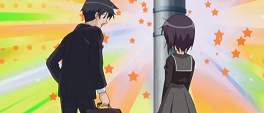

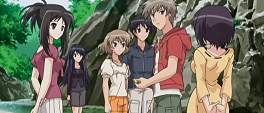

How do you rearrange the old and tired "childhood friend" romantic comedy? Fundamentally, you can't, but setting it from the perspective of the returning childhood friend is a pleasant change. Unfortunately "Myself; Yourself" is still rigidly defined by the same romantic comedy template that has been recycled again and again, in the first three of a potential thirteen episodes it explores none of the obvious avenues of character development and somehow manages to shoehorn a swimsuit episode in...
each episode is little more than straight-faced teenage drama without any form of innovation or hook
Instead of examining the shock of coming back to the place you grew up and seeing how stark the differences of then and now are, "Myself; Yourself" barrages the viewer with an instantly familiar cast of characters: the busty ditz, the flat-chested tsunderreko, the affable best-friend, the obvious ice-cold love interest and the token diversion from said love interest. If it weren't a wholly standalone project, it would be effortless to peg the series as straight out of a dating sim or ero-game. The majority of the comedy and fan-service stems from the buxom pixie, voiced by the distinctive Tomoko Kaneda, it is at first odd to hear Azumanga's Chiyo in another character, but her boundless enthusiasm and plethora of almost inaudible noises make the character, what one can only assume is, the very epitome of "moe". In contrast, the terminally bland protagonist sports an everyman personality which only makes him all the more distasteful despite his apparently dark past.
Read the rest of this entry
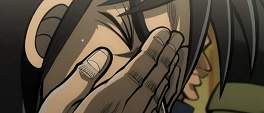

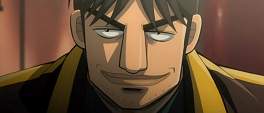
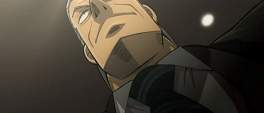
Basing a series on a tyre-slashing, out of work bum who attempts to pay off his debts through high-stakes gambling might not sound like the most auspicious character to use; however that's exactly what Kaiji does and even at the ends of society, the show exudes a manly fragrance that's hard to shift. Dense with dialogue, the first three episodes are a tense, sometimes tortured look at a man pushed to the edge.
the questionable morality of obtaining money through gambling is offset by the work the protagonist puts in to win it
To say that the series is heavy on confabulation would be an understatement; most all of the introductory episodes are taken up with overwrought monologues either from the narrator, the delightful Fumihiko Tachiki, or from Itou Kaiji's many foes describing everything from what happened in the last episode to the byzantine logic used to win the most recent gamble; it's initially comical but surprisingly, rarely feels protracted. While most of the monologues are posturing and chest-beating, each episode is pocked with tiny victories and defeats which keep things moving along to what can only be hoped is a monumental climax. What the series lacks in visceral action is more than made up for by the most animate of faces; each one able to convey a range of emotion above and beyond what's ordinarily expected of anime characters. Only the most tertiary of characters are left stoically straight-faced yet even then the art style adds volumes to what could have been merely perfunctory.
Read the rest of this entry



















